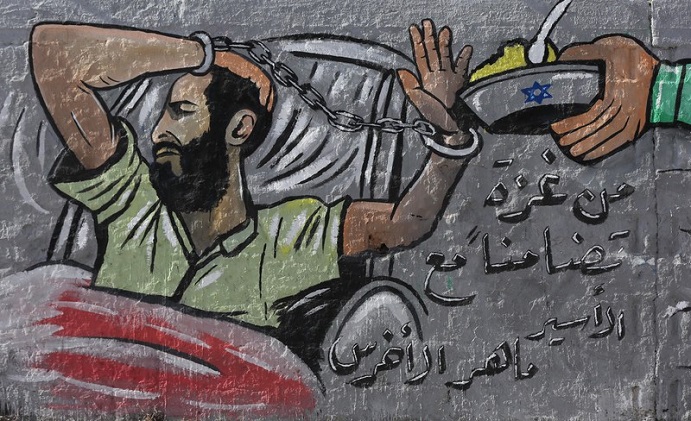
Tamara Nassar
The Electronic Intifada / October 26, 2020
Three months into Maher al-Akhras’ hunger strike, a United Nations human rights expert is demanding his immediate release.
Al-Akhras remains gravely ill. He has been protesting his imprisonment without charge by Israel by refusing all food for more than 90 days.
A video circulated by local media this week showed Israelis harassing al-Akhras’ family inside the Kaplan Medical Center in central Israel and threatening to kill him:
The Israelis can be heard singing a Jewish nationalist song and shouting “We will defeat you.”
Al-Akhras’ wife Taghrid told Safa Palestinian Press Agency that their children and her husband’s mother were in the hall outside his room when they were “attacked” by settlers.
Safa said Israelis also chanted that al-Akhras is a “terrorist” who deserves to be killed. Israeli security personnel reportedly watched and did nothing as al-Akhras’ family were abused in the halls of the hospital.
On Friday, Michael Lynk, the UN special rapporteur in occupied Palestinian territory, said doctors who examined al-Akhras “indicate that he is on the verge of suffering major organ failure,” adding that “some damage might be permanent.”
Lynk called on Israel to “immediately” release al-Akhras if it has evidence “that would be acceptable in any democratic state.”
Israel accuses al-Akhras of being a member of the Palestinian Islamic Jihad political and resistance organization, which al-Akhras denies.
Israel considers virtually all Palestinian parties to be “terrorist” organizations, meaning that any politically active person could be targeted for arrest.
The special rapporteur also called on Israel to abolish its practice of administrative detention as it is “an anathema in any democratic society that follows the rule of law.”
Under administrative detention orders, Israel can hold individuals without charge or trial and detainees are not allowed to see any evidence against them.
As of September, Israel was holding 350 Palestinians in administrative detention, including two lawmakers.
Denied release
Al-Akhras, a 49-year-old father of six, is from the occupied West Bank town of Silat al-Dahr, near Jenin.
Israel has jailed him repeatedly and he has spent a total of five years in its prisons.
Israeli forces arrested him again on 27 July and handed him a four-month administrative detention order which can be renewed indefinitely.
Al-Akhras began refusing food immediately.
Israel has brought no charges against him and he has been given no trial, even in Israel’s military courts, where there is a nearly 100 percent conviction rate against Palestinians.
His lawyer, Ahlam Haddad, repeatedly petitioned Israel’s highest court to release al-Akhras.
The high court consistently rejected all petitions, insisting that al-Akhras remain imprisoned until the end of his administrative detention order on 26 November, despite the court’s admission that he poses no threat whatsoever due to his medical condition.
Red Cross “neutral”
In the first statement since al-Akhras launched his hunger strike, the International Committee of the Red Cross said it was “seriously concerned” over the “critical” health condition of al-Akhras.
It added that it “neither supports nor advocates against a hunger strike,” as a humanitarian organization.
But despite its self-declared “neutral” stance, the Red Cross placed the onus on the prisoner, his representatives and “the competent authorities” to “find a solution that will avoid any loss of life.”
Pompeo defends Israel
Meanwhile, during a press conference last week, a reporter asked US Secretary of State Mike Pompeo to comment on al-Akhras’ strike.
“He’s on his 87th day of a hunger strike. He’s about to die,” Said Arikat of the Palestinian newspaper Al-Quds asked Pompeo.
Pompeo refused to respond on al-Akhras’ case or administrative detention in general but asserted that “Israel has the right to defend itself and make the appropriate decisions it needs to make for its own security, and we’ll continue to defend that.”
Tamara Nassar is an assistant editor at The Electronic Intifada












